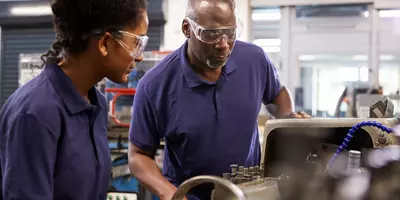
23 Sept 2024 ● Sam Andrews
The future of our industry
“There has been a transformation in the way that we talk about the ocean economy. In the past, we looked at the ocean as something that can be exploited and extracted from… but then the sustainable economy came in. Now, we’re seeing a move towards regenerative options.”
Martin Koehring, ocean futurist and former head of the World Ocean Initiative.
A regenerative ocean economy builds on the idea of sustainability to actively seek to protect and restore marine ecosystems and marine life. It also looks to build climate change resilience and create more inclusive, equitable economic benefits. We know that ‘business as usual’ is not a long-term solution. This shift in outlook is creating more jobs.
When Hannah Snead graduated with a Master of Science in Marine Conservation in 2020, she knew she was entering a difficult sector. “Getting a decent paying job in marine science, especially conservation, is not easy.”
Fortunately, Snead, who specialises in marine mammals, did find work and now works as a consultant marine ecologist with WSP.
In the few years since graduating, Snead says she’s already seen some changes in demand for the type of work she does. “Marine mammals are quite a niche area, but there are more and more marine mammal-related jobs posted now than when I first graduated.”
Although the Covid-19 pandemic likely influenced job availability, Snead says one of the main drivers has been the uptake of marine-renewable energy, particularly offshore wind. “There’s quite a lot of research that shows that marine mammals are impacted by offshore activities. For example, during installation, pile driving creates a lot of noise and vibration that can disrupt marine mammals. We do a lot of analysis on which marine mammals might be in the area around the windfarm, how they may be impacted, and look at mitigation as well,” Snead explains. For mitigation, “there is work as marine mammal observers. This involves going up to the site and making sure there are no marine mammals in the area while the work is going on. If an animal is spotted, the work is stopped until they leave a predefined area.”
Marine-renewable energy isn’t the only sector generating jobs. “For example, in shipping, we’re seeing rules surrounding net zero, which means there has to be a lot more innovation in alternative fuels – green hydrogen, ammonia, even electrification of shipping,” says Koehring. This shift towards alternative fuels will also generate new jobs, such as logistics and engineering, at ports.
Emerging marine careers
Then there are ‘marine-adjacent’ jobs. “There’s increasing focus on supply chains and sustainability. If you’re a supply chain manager, you might sit in the most landlocked country in the world, and you might still look at the ocean because you work for a retailer who cares about their supply chain emission, like from ships,” says Koehring. As another example, “you could work for a [fish] feed company looking at how to use insects, bacteria and other alternative sustainable nutrient sources [for aquaculture],” he adds.
The need to monitor the ocean and our activity is increasingly generating work for marine engineers, electricians and roboticists. Jobs in coding and modelling are ever more in demand across multiple marine sectors.
“Technology is having a huge impact on maritime careers,” says Gordon Meadow, founder and CEO of SeaBot Maritime. Alongside alternative fuels, Meadow highlights novel materials and construction, cybersecurity, digitisation, automation and artificial intelligence (AI) as areas where we can expect to see more and arguably different careers emerging.
The advancement of AI and automation, in particular, is seen as both an opportunity and a concern. Jobs have always ebbed and flowed with technological innovations. On the whole, Meadow says, “AI won’t take your job, but someone who knows how to use AI might.”
“Think about autonomous welding. It’s not just a robot that is now doing the work. There is still someone who has to set up the equipment, maintain it… the person is still involved,” he says. Even with uncrewed autonomous vessels, people are still involved. Instead of sitting on the vessel, they are in a control centre many miles from where the vessel is. “The strategy is to keep pace – continuous education development,” says Meadow, who is also chair of MASSPeople, a working group focused on shaping the competencies and capabilities of those working with autonomous surface ships and systems.
As the pace of technology advances, Meadow says that institutions and organisations need to do more to keep up to ensure people have the skills they need. “In terms of knowledge and curriculum, what we’re delivering is questionable sometimes. We need new certification programmes, and the way we produce competencies under the STCW [the International Convention on Standards of Training, Certification and Watchkeeping for Seafarers] needs to change because, at the moment, the way it’s done can’t keep pace with changes in technology.”
While Meadow and colleagues at MASSPeople are addressing competencies, the IMarEST’s Sea Your Future initiative aims to support its members’ development.
Sea Your Future “is really about trying to encourage and support early career individuals, be they students, graduates, apprentices, cadets or professionals, to develop the skills they need”, says Conor Savage, co-chair of Sea Your Future. The initiative is still in the early stages, but considering how the nature of marine careers is changing is very much on Savage’s mind. “People tend to have less traditional career journeys today: they tend to move organisations more than they used to, switch between industries and sectors… it’s about making sure that the support we can offer can cover that.”
Switching sectors is something Savage is personally familiar with. After studying the effects of Arctic sea ice retreat on species reliant on sea ice, Savage entered a Change and Business Solutions graduate programme with Ulster Bank. As part of a volunteer role there, “I built and led a team that developed and delivered climate change, biodiversity and other sustainability-related training to colleagues across the bank.” Savage now works at Sainsbury’s Bank, delivering its environmental, social and governance strategy. “My marine biology background is still relevant to the work I do today, even if I’m not working directly on the ocean in my day job,” Savage explains.
Equally, Savage is applying the skills and knowledge gained to the extensive voluntary marine work he does. Within the IMarEST alone, Savage is a Marine Mammal Special Interest Group (SIG) committee member, chair of the newly launched Polar Regions SIG and sits on the Technical Leadership Board as an early career representative – all in addition to being co-chair of Sea Your Future. “Volunteering is a fantastic way of getting involved in the things that you find fulfilling… it’s also a way of differentiating yourself from the crowd and building up new skills and knowledge that you can apply to all sorts of situations.”
The future of our oceans
Embracing knowledge from multiple sectors is something Koehring says will be increasingly important. “If I could study again, I would probably study systems science. It’s all about approaching things through a multidisciplinary lens and understanding the connectedness between systems. The ocean system overlaps with the food system, the finance system, the energy systems… you need to understand how what you do in one system impacts another.”
“Lockheed Martin has a famous phrase where it says the future is human-more, not human-less,” says Meadow. Perhaps the future is also ocean-more, not ocean-less.
This article was originally published in Marine Professional, Issue 3/2024


